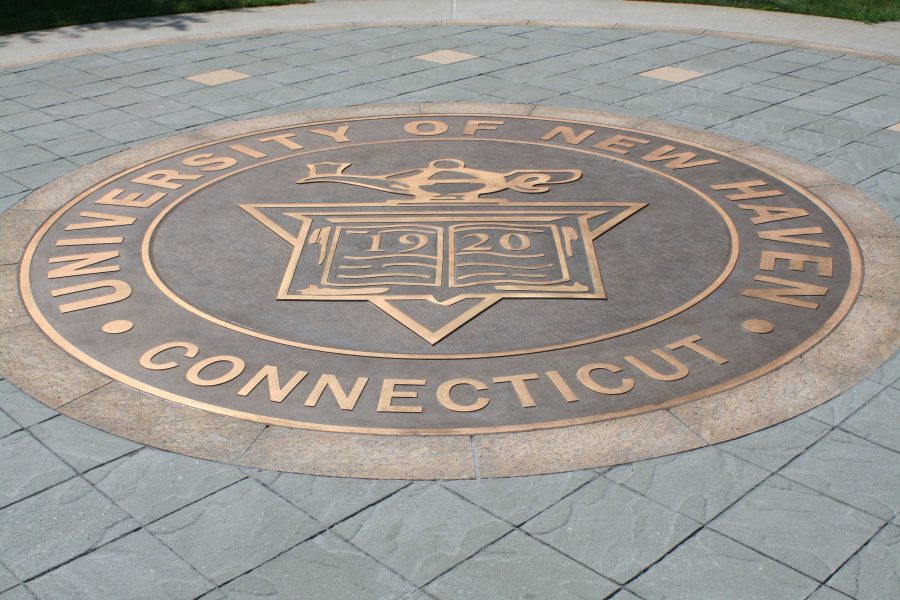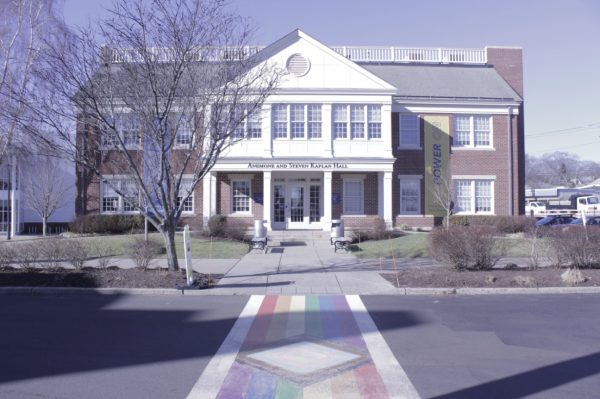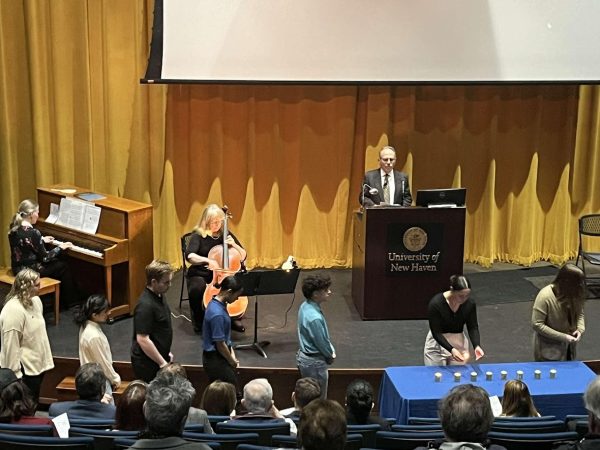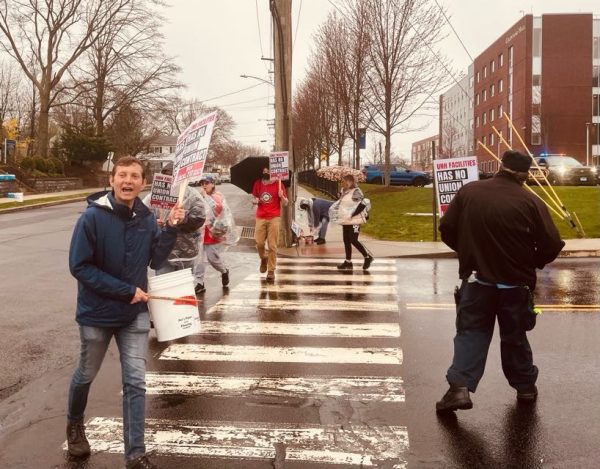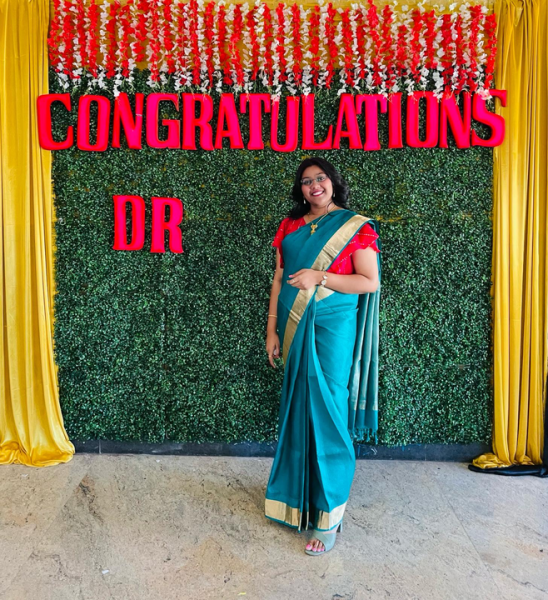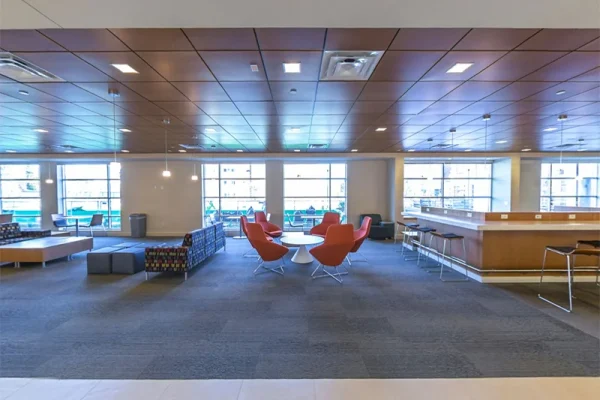University of New Haven students speak out against comments made during 9/11 remembrance speech
Courtesy of The Charger Bulletin
The new UNH logo that can be found in front of Maxcy Hall
University of New Haven students are speaking out after a speech by Jillian Fiore, American Criminal Justice Association (AJCA) Psi Omega Chapter president during the university’s 9/11 Remembrance Ceremony speech on Sept. 10.
The Undergraduate Student Government Association (USGA), the ROTC and Fire Science Club hosted the ceremony where students and university officials spoke to honor the victims of the 2001 attacks.
At the beginning of Fiore’s speech, she said that on that day in 2001, “3,000 people lost their lives due to the inhumane acts orchestrated by the Islamic extremist group al-Qaeda.”
After the ceremony, the university’s Muslim Student Association (MSA) posted a statement to their Instagram that said, “as Muslims, we have no relation or ties to terrorist groups.” The statement also said that a remark such as Fiore’s “increases Islamophobia and hate crimes. Islam does not in any way allow or excuse, hate, violence, and/or brutality.”
USGA president Sofia Martinez commented under the MSA post to thank them for bringing the issue to the organization’s attention. She also said, “I personally went through speeches to [proofread] beforehand but will look closely at the videos and content to see if anything was miscommunicated, please reach out if you have any questions or concerns.”
A day later, the USGA Instagram posted an apology on behalf of Martinez, which read, “While I do not believe the speaker intended to denigrate the Muslim community or Islam faith, we must use this opportunity to recommit ourselves to fully understanding the impact of our language. Microaggressions and anti-Muslim sentiments are hurtful.”
In the same USGA post, an apology statement from Fiore said, “I in no way intended to link the actions of al Qaeda with the Muslim faith. I now understand how this language could be hurtful and harmful to those who identify as Muslims. For that, I am sorry. I will use this as a learning opportunity.”
Fiore also promised to reach out “personally” to the MSA to “express my apologies.”
The email Fiore sent to the MSA said: “I want to extend my deepest apologies for my actions. I in no way intended to hurt and disrespect your community.”
“Over the weekend,” read the email from Fiore, “I reflected on my actions and evaluated how my words have resulted in the hurt of my fellow Chargers. I was able to assess my mistake and devise an action plan to educate myself to prevent such a thoughtless comment from happening in the future.”
Dean of students and chief student affairs officer, Ophelie Rowe-Allen, also left a comment on the Instagram post, which currently has over 60 comments, saying, “To the MSA community, Carrie Robinson [director of the Myatt Center for Diversity and Inclusion] and I are here to support you. If we can be of any assistance, please don’t hesitate to contact us.”
Laila Soliman, a sophomore engineering major and MSA’s direct of communication and event coordinator, said the online apologies are not enough. They said a public and private apology are “required” to remedy the situation
Soliman said, “Forgiving this independent incident is one thing and excusing the continuity of the bigotry is another… appropriate compensation is needed.”
After the 9/11 attacks, many Muslim-Americans faced the consequences of an act for which they were not responsible; students took note of that beneath the USGA’s Instagram post in an onslaught of comments expressing their anger at the situation and the way it was handled.
User @muiruins said in a comment, “This is simply not enough. How many people will this Instagram post alone reach? You need to send an email to the student body. This affected more than your Instagram followers.”
In an interview, MSA President Adrielys Gomez said she “couldn’t believe what [she] had heard.”
“I am a woman who is visibly Muslim,” said Gomez.“The name-dropping of my faith as a direct cause of the 3,000 lives lost is terrifying. What made it particularly unsettling was the fact that no one seemed to blink an eye. It makes me question if this would have been regarded as unacceptable if [t]he Muslim Student Association hadn’t brought it to the University of New Haven’s attention.”
Mabintou Darboe, a masters of public health student, said the comments made during the speech made her “very disappointed and scared for myself and my fellow Muslim students.”
“September is the only month in America when I feel unsafe walking alone or out late at night,” said Darboe. “People do not realize that Muslims, too, are affected by the aftermath of 9/11… I hope the university and the parties involved realize that connecting Islam to the 9/11 attacks… puts us in danger.”
Gomez said, “If it was intended to be an act of self-awareness, as their action plan indicates, the words ‘I am sorry’ were absent from the statements delivered to the community. The greatest thing you can do sometimes is to try to understand why individuals are uncomfortable, then apologize and accept responsibility for your actions/words.”
As words of encouragement to the University of New Haven’s Muslim community, Gomez said, “Please continue to stand up for what is right, you are saving lives, the same lives that others seem to forget and not remember on the day of 9/11.”
The USGA hosted a Dinner and Dialogue event at 8:15 p.m. on Sept. 14 at 8:15 PM at Bergami 307. At the forum, students spoke about the words used during the remembrance speech, shared their personal experiences with Islamophobia and discrimination in a productive conversation about the changes required to move on from the speech.
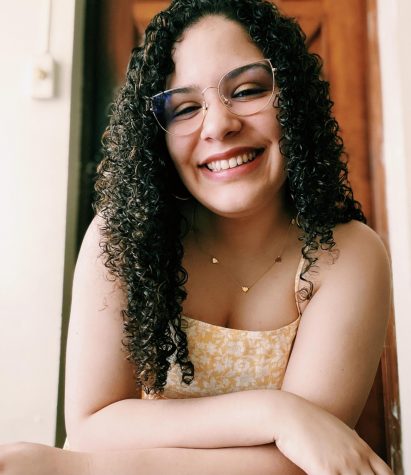
Amanda is a senior majoring in communication with a concentration in journalism, and a double minor in political science and English. She has been involved...

